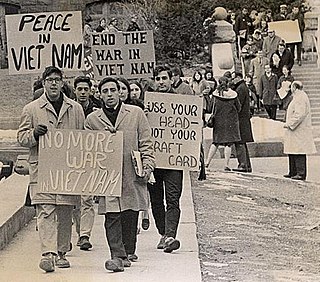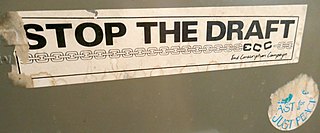
A conscientious objector is an "individual who has claimed the right to refuse to perform military service" on the grounds of freedom of thought, conscience, or religion. The term has also been extended to objecting to working for the military–industrial complex due to a crisis of conscience. In some countries, conscientious objectors are assigned to an alternative civilian service as a substitute for conscription or military service.

The Conscription Crisis of 1917 was a political and military crisis in Canada during World War I. It was mainly caused by disagreement on whether men should be conscripted to fight in the war, but also brought out many issues regarding relations between French Canadians and English Canadians. The vast majority of French Canadians opposed conscription; they felt that they had no particular loyalty to either Britain or France. Led by Henri Bourassa, they felt their only loyalty was to Canada. English Canadians supported the war effort as they felt stronger ties to the British Empire. On January 1, 1918, the Unionist government began to enforce the Military Service Act. The Act caused 404,385 men to be liable for military service, from which 385,510 sought exemption.

Draft evasion is any successful attempt to elude a government-imposed obligation to serve in the military forces of one's nation. Sometimes draft evasion involves refusing to comply with the military draft laws of one's nation. Illegal draft evasion is said to have characterized every military conflict of the 20th and 21st centuries, in which at least one party of such conflict has enforced conscription. Such evasion is generally considered to be a criminal offense, and laws against it go back thousands of years.

A conscription crisis is a public dispute about a policy of conscription, or mandatory service in the military, known in US English as a "draft". A dispute can become a crisis when submission to military service becomes highly controversial and popular revolt ensues. From the point of view of military officials, the crisis is one of supply; where they may claim to lack enough troops to accomplish a military objective, and have, to some degree, lost control of their political ability to enforce existing conscription law.

Conscription in Australia, also known as National Service following the Second World War, has a controversial history which dates back to the implementation of compulsory military training and service in the first years of Australia's nationhood. Military conscription for peacetime service was abolished in 1972.

In the United States, military conscription, commonly known as the draft, has been employed by the U.S. federal government in six conflicts: the American Revolutionary War, the American Civil War, World War I, World War II, the Korean War, and the Vietnam War. The fourth incarnation of the draft came into being in 1940, through the Selective Training and Service Act; this was the country's first peacetime draft. From 1940 until 1973, during both peacetime and periods of conflict, men were drafted to fill vacancies in the U.S. Armed Forces that could not be filled through voluntary means. Active conscription in the United States ended in 1973, when the U.S. Armed Forces moved to an all-volunteer military. However, conscription remains in place on a contingency basis; all male U.S. citizens, regardless of where they live, and male immigrants, whether documented or undocumented, residing within the United States, who are 18 through 25 are required to register with the Selective Service System. United States federal law also continues to provide for the compulsory conscription of men between the ages of 17 and 44 who are, or who have made a declaration of intention to become, U.S. citizens, and additionally certain women, for militia service pursuant to Article I, Section 8 of the United States Constitution and 10 U.S. Code § 246.
Simon Townsend is an Australian journalist who became a popular television host during the 1980s. He is now retired.

Compulsory military training (CMT), a form of conscription, was practised for males in New Zealand between 1909 and 1972. Military training in New Zealand has been voluntary before then and ever since.
Archibald McColl Learmond Baxter was a New Zealand socialist, pacifist and conscientious objector.
The Central Committee for Conscientious Objectors (CCCO) was a United States nonprofit organization dedicated to helping people avoid or resist military conscription or seek discharge after voluntary enlistment. It was active in supporting conscientious objectors ("CO's"), war resisters and draft evaders during the Vietnam War. Founded in Philadelphia in 1948 and dissolved in 2011, CCCO emphasized the needs of secular and activist COs, while other organizations supporting COs principally focused on religious objectors and/or legislative reform and government relations.
Conscientious objection to military taxation (COMT) is a legal theory that attempts to extend into the realm of taxation the concessions to conscientious objectors that many governments allow in the case of conscription, thereby allowing conscientious objectors to insist that their tax payments not be spent for military purposes.

The End Conscription Campaign was an anti-apartheid organisation allied to the United Democratic Front and composed of conscientious objectors and their supporters in South Africa. It was formed in 1983 to oppose the conscription of all white South African men into military service in the South African Defence Force.
South African resistance to war has a long tradition, and a history that includes conscientious objectors, pacifists, deserters and draft dodgers, as well as those whose objections are based upon the notion of "just war" as opposed to unjust or illegal war.
Halil Savda is a Turkish conscientious objector who has been subjected to continued arrest and conviction for his refusal to serve mandatory military service – in violation of Turkish law.
Stephen Spiro (1939–2007) was a political activist known for his opposition against the Vietnam War and his advocacy of an ideology that opposes abortion, capital punishment, assisted suicide, and euthanasia. Opposing the Vietnam war based on the theory of Just War, he objected to being conscripted, but as the law only allowed for conscientious objection to all wars, he was convicted of avoiding conscription and given a suspended sentence of five years. He was later pardoned by President Gerald Ford.
Gillette v. United States, 401 U.S. 437 (1971), is a decision from the Supreme Court of the United States, adding constraints on the terms of conscientious objection resulting from draftees in the Selective Service.
The Non-Combatant Corps (NCC) was a corps of the British Army composed of conscientious objectors as privates, with NCOs and officers seconded from other corps or regiments. Its members fulfilled various non-combatant roles in the army during the First World War, the Second World War and the period of conscription after the Second World War.

The Insubordinate movement was a mass antimilitarist movement of civil disobedience to compulsory military service in Spain, the movement lasting from the early 1970s until the abolition of conscription on 31 December 2001.
Conscientious objection in the United States is based on the Military Selective Service Act, which delegates its implementation to the Selective Service System. Conscientious objection is also recognized by the Department of Defense.
While the Republic of Korea's Constitution states that all citizens, regardless of gender, sex, political or religious affiliation, should be afforded equal treatment under the law, some scholars, such as Intaek Hwang, claim that the culture of militarism is so pervasive that Conscientious Objectors are stripped of the rights discussed in the Constitution when universal male conscription became the law in 1948. A Conscientious Objector is defined as "an individual who has claimed the right to refuse to perform military service on the grounds of freedom of thought, conscience and or religion" by the United Nation's Human Rights Commission. Since the signing of the Conscription Law in 1949, stating that every male 18 years of age must serve in the military, Conscientious Objectors, when found, are arrested and subject to violent punishments.





